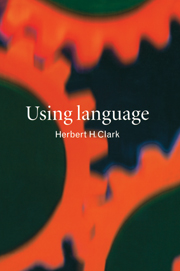2 - Joint activities
Published online by Cambridge University Press: 05 June 2012
Summary
Language use arises in joint activities. You call up your sister for an address, or talk to a friend about what to take on a picnic, or discuss news with a colleague. If you were later asked “What did you do?” you wouldn't describe your acts of speaking. You would describe the joint activities you took part in. “I got an address from my sister.” “My friend and I decided what to bring on a picnic.” “A colleague and I traded gossip.” In each case, you take the joint activity to be primary, and the language you used along the way to be secondary, a means to an end. To account for the language used, we need to understand the joint activities.
A discourse is one type of joint activity – one in which language plays an especially prominent role. Originally the term discourse meant conversation or dialogue – literally, a running back and forth – but nowadays it includes lectures, interviews, interrogations, plays, novels, essays, personal letters, and much much more. But if discourses are a type of joint activity, we will never understand how they work until we understand more generally how joint activities work. This, then, is another reason for investigating joint activities.
And just as language use arises in joint activities, these are impossible without using language. Two or more people cannot carry out a joint activity without communicating, and that requires language use in its broadest sense. Yet whenever people use language, they are taking joint actions. Language use and joint activity are inseparable.
- Type
- Chapter
- Information
- Using Language , pp. 29 - 58Publisher: Cambridge University PressPrint publication year: 1996
- 1
- Cited by



